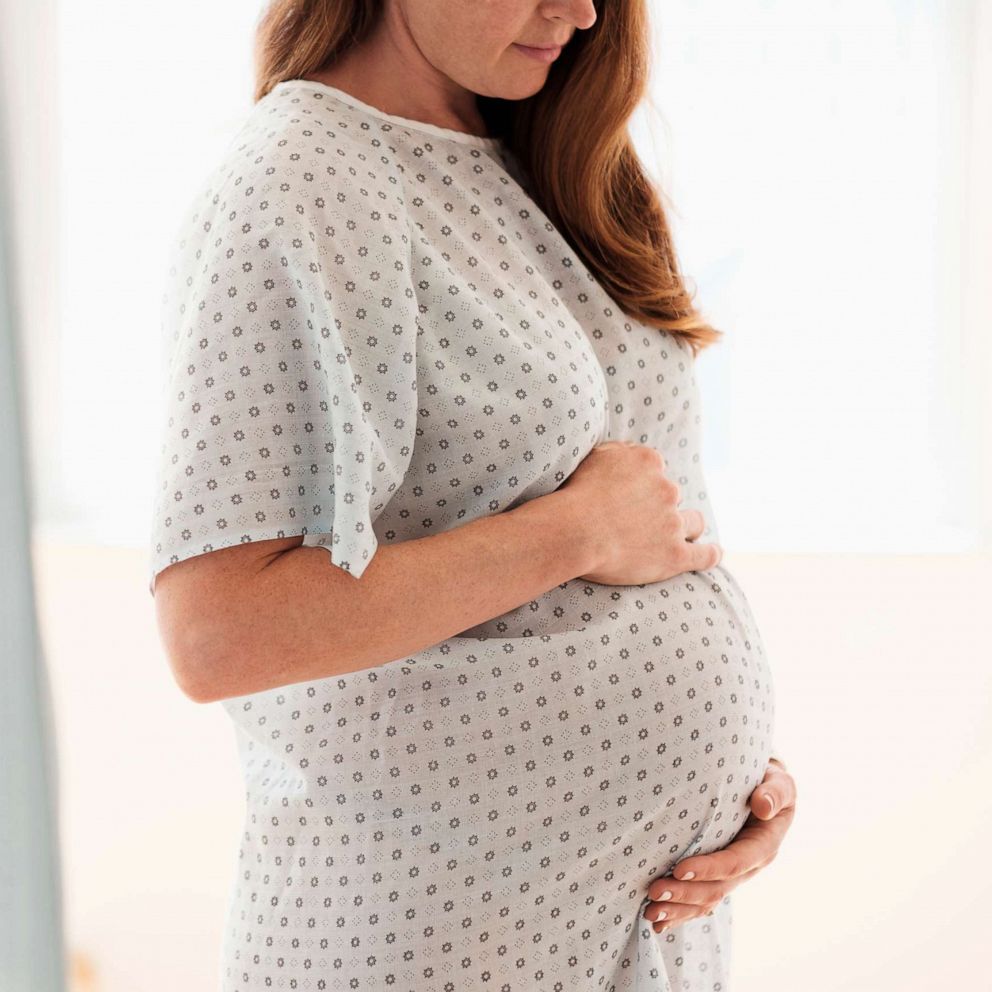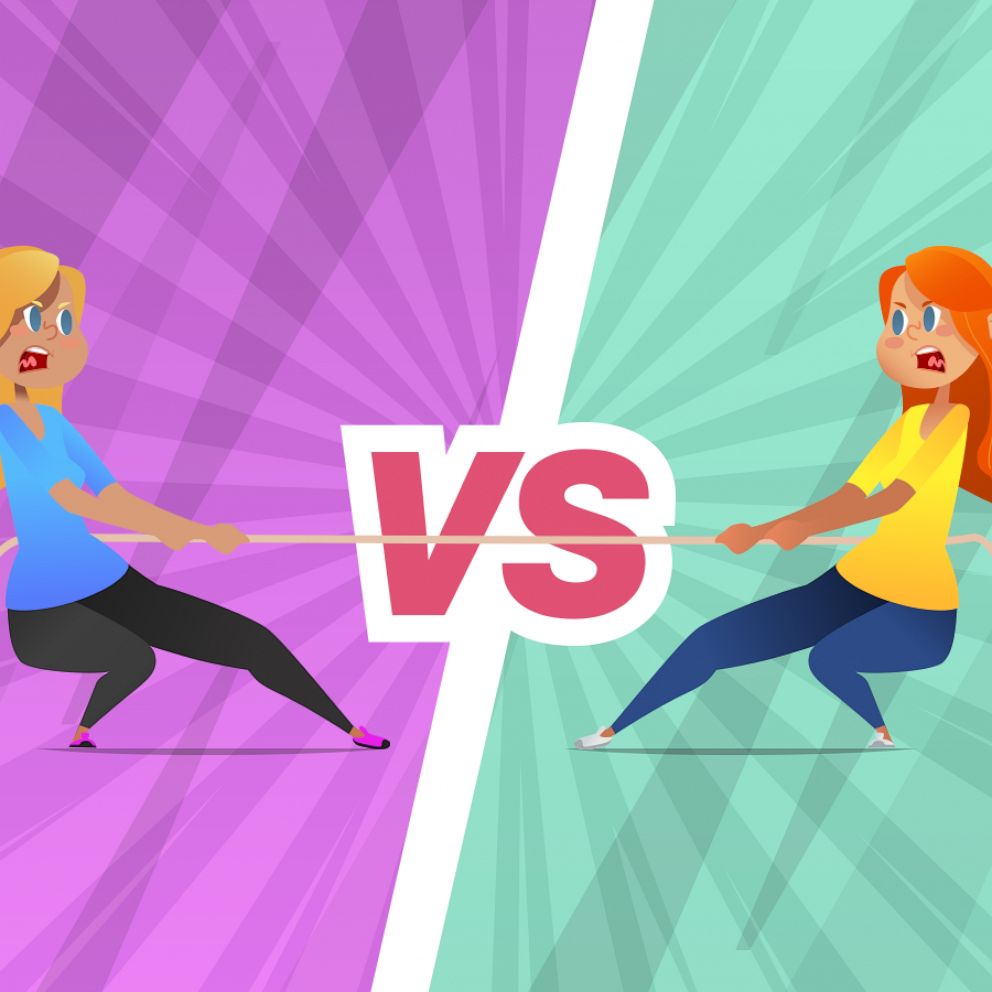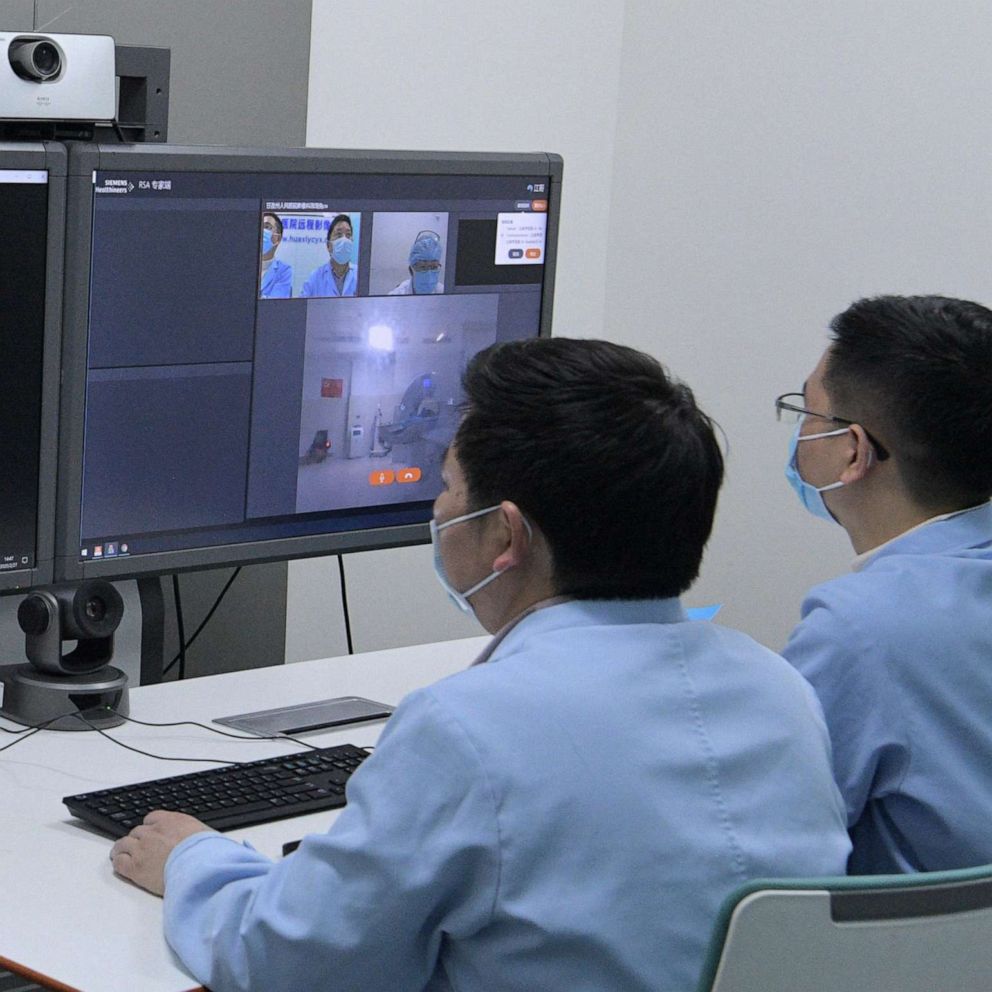New moms face challenge of breastfeeding during coronavirus pandemic
Access to support has become harder and anxiety has increased, experts say.
Breastfeeding advocates have seen an increased interest in nursing during this time of coronavirus, but they say the pandemic may be creating more challenges and concerns for new moms.
According to the Centers for Disease Control and Prevention, 60% of mothers generally do not end up breastfeeding for as long as they had originally planned to. Factors reducing the duration are varied and may include unsupportive hospital or work policies, problems with lactation or latching, or concerns about the baby's weight, the organization says.
These factors are being amplified during the pandemic for mothers who choose to breastfeed and are at home or starting to return to work.
"I think that the pandemic is exposing a lot of the problems that many of us already knew were there," said Abby Theuring, founder of the advocacy group The Badass Breastfeeder. "We're seeing just how few options there really are for people, especially women, who are generally the primary caregivers of our kids."
'As long as possible'
Both the American Academy of Pediatrics (AAP) and the World Health Organization recommend exclusive breastfeeding for the first six months, with continued breastfeeding alongside solids for at least one year or, as the WHO advises, at least two. But medical professionals and breastfeeding advocates are quick to advise that "fed is best," whether that's from breast milk, formula, or a combination of the two.
Breastfeeding rates decrease throughout babies' first year, according to the CDC. Based on the latest figures, 83.8% of children in the U.S. have been breastfed at some point, 57.3% are still breastfed at six months, and 36.2% are still breastfed at 12 months. This decrease is likely due to lack of ongoing support, the CDC says.
It'll likely be several years before official statistics are available for this time period, but public health experts have noticed an increase in breastfeeding interest from mothers during the pandemic.
"There's anecdotal evidence that, in fact, more mothers are breastfeeding since the COVID pandemic, and breastfeeding for longer," Dr. Lori Feldman-Winter, professor of pediatrics at the Cooper Medical School of Rowan University and chair of the AAP's Section on Breastfeeding, told ABC News. "Maybe there's no better case for paid leave since the mothers are actually at home and able to breastfeed for longer."
Online articles published during the pandemic by breastfeeding support organization La Leche League International have been "wildly successful," Executive Director Zion Tankard told ABC News. The organization has also seen an uptick in calls to its 24-hour hotlines, as well as increased interest in relactation. Some moms concerned about the availability of breastmilk substitutes are also continuing nursing, Tankard said.
Bronx, New York-based blogger Danyelle Jacobs, who writes about motherhood in the blog Napturally Dany, had initially planned to start weaning her third child after she turned 1 in June, as she did with her other children. But now, she wants to nurse her daughter as long as she can.
"I feel like in these times, it's better to nurse for as long as possible," Jacobs told ABC News. "There's so many good qualities and good stuff in breast milk. ... I love the bond, and I really want her immune system to be as strong as possible with everything that's going on in the world today."
Health authorities including the AAP, WHO, and CDC, have continued to recommend breastfeeding during the pandemic -- including for mothers who have confirmed cases of COVID-19, as long as they follow safety precautions while nursing or pumping. The AAP, in its guidelines, directs mothers who are actively COVID-19 positive to pump breast milk rather than deliver it through direct nursing, unless the mother has been without a fever for at least 72 hours; has not been using Tylenol, Advil, etc.; and has waited seven days after the start of COVID-19 symptoms.
Among its benefits, nursing can help relieve stress and anxiety in moms and is an optimal form of nutrition -- and while it's still unknown if breast milk can protect against COVID-19 specifically, the antibodies in breast milk can help protect children against many other illnesses.
"COVID is not the only virus that's out there," Feldman-Winter said, noting that enteroviruses are common in the summer and influenza is common in the fall and winter. "It's much better if that infant has breastfed according to our recommendations … because that is the best way to protect that baby, particularly from hospitalization due to severe gastroenteritis or lower respiratory tract infection."
There is currently no proof that COVID-19 affects pregnant women differently, according to the CDC. Moms may be worried about infecting their baby with COVID-19 through breast milk, but there is currently no evidence of that either.
"That's just simply not the case," said Dr. Lars Bode, a researcher at the University of California, San Diego, currently studying if human milk can transmit COVID-19 or protect infants from the virus. "We want to make sure that women are encouraged to keep breastfeeding because that's really the best thing they can do right now."
Fear, confusion and anxiety
Before they have their baby, staying on top of varied or changing hospital COVID-19 guidelines may be confusing and stressful for pregnant women.
"You go on the internet and there's nothing to feel but fear," Theuring said. "There's so much scary information going around."
To limit potential exposure, hospital childbirth and breastfeeding classes and tours, once a staple of the pregnancy to-do list, are likely to be canceled.
When it's time for the delivery, moms can expect to be tested for the COVID-19 virus, and hospitals have their own policies in place if patients test positive. A recent study by physicians at Columbia University Irving Medical Center and NewYork-Presbyterian found that 15% of expectant mothers admitted to two maternity wards in Manhattan in early spring tested positive for the coronavirus, most with no symptoms.
If a mother tests positive, the CDC recommends temporary separation, such as placing the newborn at least six feet from the mother, in an isolette, or in a separate room. The measures typically vary based on the risk of transmission and may be at odds with recommendations of skin-to-skin immediately following delivery to support breastfeeding.
Hospital stays have also been shortened amid the outbreak to reduce exposure. The American College of Obstetricians and Gynecologists recommends reducing stays for healthy moms and newborns to one day following birth for vaginal births and two days following birth for cesarean births. A mom may be discharged before seeing a lactation consultant.
"I keep hearing, they weren't able to get a lot of time with a lactation consultant, or they couldn't get any time at all," New York-based lactation consultant Heather McFadden told ABC News. "They're kind of leaving the hospital a little out in the woods. So that's been scary for them."
Becky Bernstein, a pediatric advanced registered nurse practitioner and mom to 4 1/2-month-old twins, has taken to Instagram to share advice on breastfeeding multiples, such as tandem feeds.
"I've had a lot of people reach out to me on Instagram that are not able to have lactation consultants help them because they're being discharged so quickly after their deliveries," the Miami resident told ABC News. "They can't even get someone to come and show them how to get the baby to latch."
Along with other birth workers in her area, Erica Hernandez, a San Antonio-based chiropractor and doula, has done telehealth sessions for expectant parents during the pandemic. COVID-19 "was something huge that got piled on top of everything else that they already have to worry about when they're having a baby," the founder of Empowered Chiropractic + Massage told ABC News.
Hernandez has also personally felt the stress of the pandemic. Before she gave birth to her fourth child in a planned home birth three weeks ago, she worried about what would happen if she had to go to the hospital. "There was a little bit of anxiety about our plans possibly changing," Hernandez said.
At home, isolation
Once home with their newborn, many moms who want to breastfeed are experiencing a greater feeling of isolation now, experts say. La Leche League International has heard from moms who feel alone, with minimal or no breastfeeding support. "Mothers are told to push through the pain or go heavy on formula supplements," Tankard said. "Sometimes they're struggling with a lack of in-person health professional support, especially as it relates to newborn or postpartum checks."
Theuring, too, has observed that women have less support during the pandemic.
"Because we're staying home and we're not meeting face-to-face, people are having less contact with lactation consultants and even just friends or peers or other parents that are breastfeeding," Theuring said. "That is something that is very helpful when you're getting started with breastfeeding."
It can be especially trying for moms of multiples, who are trying to get two babies to latch and are working to figure out a feeding schedule.
"There's really not a lot of information that I found out there," Bernstein said. "It's a whole different ball game when you're nursing twins. ... I definitely feel like a new mom again at times."
Bernstein said it's stressful if she's pumping less than usual. "It's hard to reach into my freezer stash, because I know there's also a formula shortage," she said.

Going back to work while nursing also brings about increased questions and concerns, especially around contamination and exposure. Hernandez plans to return to her practice soon. Normally, she'd have her baby in the office to breastfeed on demand. But now she's not sure what she'll do.
"I'm not sure how that will work out, or how it will affect our breastfeeding relationship," said Hernandez, who also nurses her 2-year-old. "Hopefully we won't see any negative impacts from it."
Going virtual
Like office meetings and family meetups, breastfeeding support has gone virtual during the pandemic.
"While we like to see in person that first follow-up visit and get a reliable weight, moms and babies can have multiple visits thereafter with breastfeeding specialists, so that breastfeeding can actually get off to a really good start," Feldman-Winter said. "It doesn't have to necessarily happen in the hospital, as long as there's really good follow-up."
La Leche League has made all its meetings virtual, across the globe. And lactation consultants have also shifted to video consultations, many for the first time.
Nikki Katsuki, a Queens, New York-based lactation consultant, had always done home visits but went virtual right before New York City's stay-at-home order went into effect in late March.
"I was wondering, is this going to work? Because it's so different from the actual home visit," Katsuki told ABC News. "I never did it before, so I wasn't confident. But once I did it, it worked very well."
Normally Katsuki would bring a scale on home visits to weigh the baby before and after the feeding in order to see how much milk they were getting. Now, instead of using a scale, one thing she does is find out how many diaper changes there have been.
McFadden had briefly thought about continuing home visits -- the health professionals could be considered essential workers, she said -- but quickly moved to virtual visits to limit risk. Although unable to use a scale or perform suck exams, she says the remote sessions have been going well using props like a baby doll and foam breast, or by dropping off a scale if necessary.
Despite the online access, both McFadden and Katsuki have noticed a decrease in business since going virtual.
"I don't have tons of appointments right now. I used to be extremely busy," McFadden said.
McFadden thinks in part it's because moms might not realize there is virtual support -- and that it can be effective.
"It's more than just looking at a latch," she said. "We can talk about pumping. We can talk about proper bottle feeding. We can talk about, is this baby colicky? Is this reflux? There's so much that actually can come up and get discussed."
Finances could be another factor. Many lactation consultants don't take insurance, and families might not be able to afford the service -- especially now amid record unemployment filings.
And not everyone has access to virtual technology.
"We should always be aware that all these resources aren't necessarily distributed in an equitable fashion, that there are many mothers that don't have internet access or don't have smartphones and can't get access to the same kinds of resources as others," Feldman-Winter said. "I think we always have to be aware and do whatever we can to reach out to mothers that are underserved and may be difficult to reach."
A new normal
Both McFadden and Katsuki are open to continuing to offer virtual visits, even after stay-at-home orders lift.
"I prefer the personal connection with my moms and babies. I like to be able to reach across and touch a shoulder and say, 'You've got this.' I really miss that. I miss holding a newborn baby," McFadden said. "But if someone -- and I expect this, even in a year, two years -- if somebody's like, 'Yeah, we just don't want anybody coming in anymore to our home, we're trying to be really careful,' I at least now feel prepared and know that I can still do a lot in the virtual visit, whereas when this started, I had doubts."
As the rare lactation consultant who speaks Japanese, Katsuki also sees virtual consultations as a way to offer support for Japanese speakers when she can't provide home visits.
For some women who have found themselves no longer commuting to a workplace, the pandemic has actually made breastfeeding easier. Bernstein was recently furloughed from her hospital, "which has been good and bad," she said.
"I'm able to stay with my babies longer, I've been able to nurse them and not have to worry about pumping as much, so that's been kind of a blessing," she said.
Breastfeeding at home surrounded by your family also can help to normalize the practice, Tankard said.
"We've had social stigmas around breastfeeding," she said. "The support that you can get within your own home is crucial at this time."
What to know about the coronavirus:
- How it started and how to protect yourself: Coronavirus explained
- What to do if you have symptoms: Coronavirus symptoms
- Tracking the spread in the U.S. and worldwide: Coronavirus map
Tune into ABC at 1 p.m. ET and ABC News Live at 4 p.m. ET every weekday for special coverage of the novel coronavirus with the full ABC News team, including the latest news, context and analysis.







